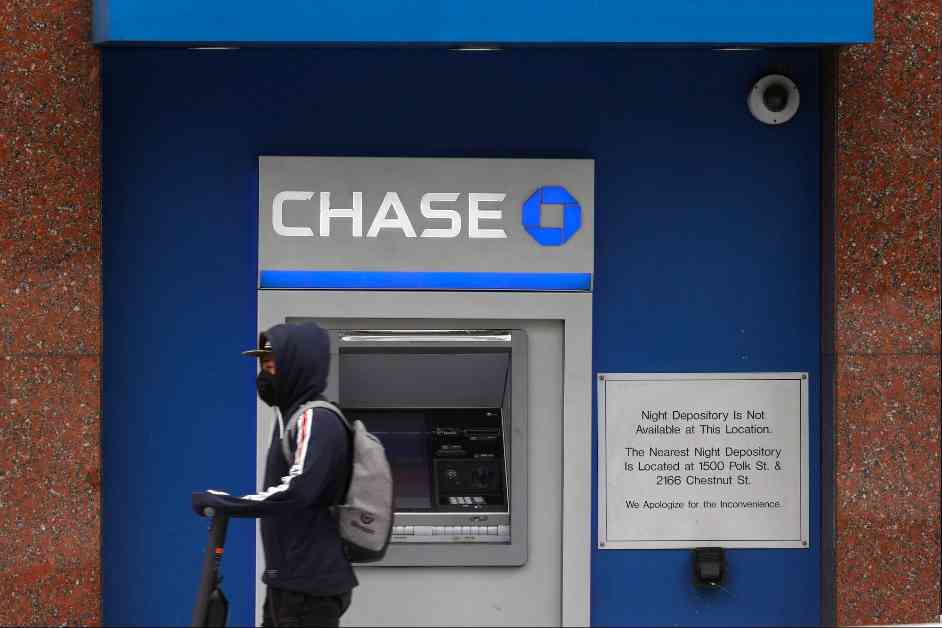Chase Bank recently found itself at the center of a fraudulent scheme that took advantage of a supposed ‘glitch’ in their ATM systems. What initially appeared to be a new TikTok trend promising free money turned out to be nothing more than a classic case of check fraud. The scheme involved depositing a check for a high amount and quickly withdrawing most of the funds before the check bounced. This led to a surge in lines forming at Chase Bank branches in New York as people sought to exploit the loophole.
A post about the scam on social media platform X garnered over 7.5 million views, sparking widespread interest in the fraudulent activity. However, Chase Bank was quick to address the situation, confirming that they were aware of the issue and taking immediate steps to rectify it. The bank promptly fixed the error, locked accounts that had taken advantage of the glitch, and adjusted negative balances with the notation “DR DUE TO ATM/DEP ERROR.”
A spokesperson for Chase Bank issued a stern warning against engaging in fraudulent activities, emphasizing that depositing a fraudulent check and withdrawing funds from one’s account constitutes clear-cut fraud. The rise in check fraud has been alarming, with a staggering 385% increase since the onset of the pandemic. While social media platforms like TikTok may have inadvertently facilitated the spread of the Chase glitch trend, there have been instances where such platforms have been used positively in the realm of personal finance.
One such example is the “pay off my debt” trend on TikTok, where users unite to support each other in achieving financial goals. Jake Burgett, a physician assistant student who spearheaded the trend, emphasized the importance of financial stability as a long-term endeavor. He cautioned against the allure of quick financial fixes promoted on social media, urging individuals to prioritize financial responsibility and avoid making sacrifices beyond their means.
The Impact of Fraudulent Trends on Financial Institutions
The emergence of fraudulent trends like the one targeting Chase Bank raises concerns about the vulnerability of financial institutions to exploitation. While technological advancements have streamlined banking processes and enhanced convenience for customers, they have also created new opportunities for fraudulent activities. The Chase glitch incident underscores the need for robust security measures and vigilant monitoring to detect and prevent fraud effectively.
Financial institutions must continuously update their systems and protocols to stay ahead of sophisticated fraud schemes. The rapid spread of fraudulent trends on social media platforms poses a significant challenge for banks and underscores the importance of proactive measures to safeguard customer assets. By promptly addressing issues like the Chase glitch and implementing stringent security measures, banks can protect their customers and uphold the integrity of the financial system.
The Role of Social Media in Personal Finance
While social media platforms have been instrumental in raising awareness about personal finance and fostering financial literacy, they have also been exploited for fraudulent purposes. The viral nature of social media trends can amplify the impact of fraudulent schemes, as seen in the case of the Chase glitch. It is essential for individuals to exercise caution and skepticism when encountering financial advice or promises of quick wealth on social media platforms.
Despite the risks posed by fraudulent trends, social media can be a valuable tool for promoting financial education and empowerment. Platforms like TikTok have been used to share personal finance tips, success stories, and strategies for achieving financial goals. By leveraging the collective wisdom and support of online communities, individuals can navigate the complexities of personal finance and make informed decisions about their financial future.
Promoting Financial Responsibility and Ethical Behavior
The prevalence of fraudulent trends like the Chase glitch highlights the importance of promoting financial responsibility and ethical behavior among consumers. Engaging in fraudulent activities not only jeopardizes one’s financial well-being but also undermines the trust and integrity of the financial system. It is incumbent upon individuals to educate themselves about financial best practices, exercise prudence in their financial decisions, and resist the temptation of get-rich-quick schemes.
Financial institutions also play a crucial role in promoting ethical behavior and deterring fraudulent activities. By implementing robust security measures, conducting thorough due diligence on transactions, and educating customers about the risks of fraud, banks can create a culture of transparency and accountability. Collaboration between financial institutions, regulatory authorities, and law enforcement agencies is essential to combatting financial fraud effectively and protecting consumers from financial harm.
In conclusion, the Chase glitch incident serves as a stark reminder of the dangers posed by fraudulent trends and the importance of maintaining vigilance in financial matters. By staying informed, exercising caution, and adhering to ethical principles, individuals can safeguard their financial well-being and contribute to a more secure and resilient financial system. Financial institutions must continue to prioritize security and fraud prevention to protect their customers and uphold the trust and confidence of the public. Together, we can combat financial fraud and promote a culture of financial responsibility and integrity.






















